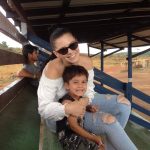Published: 14th of November, 2024 by Patrick Carpen
Last updated: November 14, 2024 at 22:25 pmLocated in the North Rupununi region of Guyana’s Region 9, Rewa Village is an enchanting place known for its unspoiled natural beauty, rich biodiversity, and the sustainable tourism model pioneered by its Rewa Eco Lodge.

Geographic Location and Elevation
Rewa Village sits at a relatively low elevation of about 335 feet (102 meters) above sea level, nestled within the sprawling savannas and forests of the North Rupununi region. Situated approximately 5 degrees north of the Equator (4.0865° N latitude, 59.4625° W longitude), the village experiences a warm tropical climate year-round. Its proximity to the Equator provides a unique environment where the flora and fauna thrive, and temperatures are generally consistent across the seasons.

Climate and Temperature Ranges
Due to its equatorial position, Rewa has a warm, humid climate with abundant rainfall, particularly from May to August. The average daytime temperature ranges between 27–32°C (80.6–89.6°F), while at night, temperatures cool down slightly to between 20–24°C (68–75.2°F). Though the climate is generally warm, the area does experience some variation; temperatures can reach highs of about 35°C (95°F) during the hottest days and dip to a rare low of around 18°C (64.4°F) on cooler nights.

Population and Community Life
Rewa is a small, close-knit community of approximately 300–400 people, most of whom belong to the Makushi Indigenous group. The residents are known for their strong cultural heritage, with traditional practices, languages, and communal values playing an essential role in daily life. Community gatherings, celebrations, and festivals are integral to the village’s social structure, and residents work together to maintain a harmonious lifestyle in sync with nature.

Health Facilities and Access to Care
The village has a basic health outpost staffed by trained community health workers who provide first aid, vaccinations, maternal care, and general healthcare services for minor illnesses and injuries. For more complex medical needs, residents travel to the nearby town of Annai, where a more extensive health facility can address moderate health issues. In cases requiring advanced medical care, the nearest hospital is located in Lethem, about 80 kilometers away by road.

Education and Schooling
Rewa Village has a primary school which provides education to young children up to the elementary level. For secondary education, students generally travel to the neighboring community of Annai, which has a secondary school. Due to the distances involved, some students stay with relatives or board in Annai during the school term. Efforts are underway to improve educational facilities in the region, ensuring more access to resources and qualified teaching staff.

Bordering Villages and Surrounding Communities
Rewa is bordered by several other Indigenous villages, each sharing a mutual relationship in terms of culture, resources, and social connections. To the east lies the village of Crash Water, while to the west is Apoteri, another community with access to the Rupununi River. Annai is situated to the south, and to the north, one can find the village of Yupukari, known for its turtle conservation initiatives. These neighboring villages often collaborate on projects, trade goods, and share cultural events, fostering a strong network of community ties in the Rupununi.

Flora and Fauna of Rewa Village
Rewa is celebrated for its exceptional biodiversity, thanks to its proximity to both rainforest and savanna ecosystems. The village is surrounded by dense forests, wetlands, and grasslands, home to an astonishing variety of plants and animals. Among the flora are tall greenheart trees, broad-leaved moriche palms, and a variety of medicinal plants used by the Makushi people.

The area is a haven for wildlife enthusiasts, offering sightings of iconic Amazonian species such as jaguars, giant river otters, tapirs, capybaras, and anacondas. Rewa’s birdlife is equally impressive, with species such as the harpy eagle, scarlet macaw, and hoatzin frequently spotted in the area. The lush vegetation and wildlife make Rewa a paradise for ecologists and photographers alike.

Rivers and Waterfalls Near Rewa
The Rewa and Rupununi Rivers are the lifelines of the village, providing essential resources for fishing, transport, and sustenance. The Rewa River is particularly significant as it supports a rich ecosystem, making it an ideal location for ecotourism activities such as river cruises, fishing expeditions, and birdwatching tours.

While there are no large waterfalls directly within Rewa Village, smaller cascades and rapids along the rivers provide beautiful natural spots for relaxation and exploration. For those willing to venture farther, Kaieteur Falls—a massive and iconic waterfall in Guyana—is accessible via guided tours from the region, though it requires significant travel by boat and plane.

Economic Activities
The economy of Rewa Village is primarily based on subsistence agriculture, fishing, and small-scale craft-making. Residents cultivate crops such as cassava, corn, and peanuts, which are used for personal consumption and occasionally sold in local markets. Cassava is especially important, as it is transformed into various products like farine and cassava bread, staples in the Makushi diet.

Fishing is another vital activity, with the rivers teeming with species like the arapaima, piranha, and pacu. Catching and selling fish, especially sustainably sourced arapaima, provides additional income for some households. Handcrafted items such as woven baskets, pottery, and jewelry are also produced using locally sourced materials, adding to the community’s income, especially when sold to tourists.

Tourism and the Rewa Eco Lodge
A key part of Rewa’s economy is the Rewa Eco Lodge, a community-owned and operated facility that has gained recognition as a sustainable tourism model in Guyana. Built and managed by the village residents, the Eco Lodge offers a unique, eco-friendly experience to visitors. Guests can enjoy activities such as guided nature hikes, canoe trips along the Rewa River, catch-and-release fishing, and cultural exchanges with the Makushi people.

The lodge’s construction reflects the traditional architectural style of the Makushi, using sustainable materials like wood and thatch. Its focus on low-impact tourism ensures that the environment is preserved, and revenues from the lodge are reinvested into community projects, healthcare, and education. Rewa Eco Lodge has garnered international attention, particularly among eco-conscious travelers, conservationists, and researchers, offering a model for sustainable tourism that respects both nature and Indigenous culture.

Tourist Attractions and Outdoor Activities

Rewa Village offers numerous attractions that draw tourists from around the world, especially those interested in eco-tourism and wildlife. Some popular activities include:
Wildlife Watching: Guided excursions to see jaguars, giant river otters, and exotic birds are popular among visitors.
Birdwatching: With its impressive avian diversity, Rewa is a paradise for birdwatchers who can spot rare species like the harpy eagle and cock-of-the-rock.
Fishing Expeditions: The village’s rivers are home to the arapaima, one of the world’s largest freshwater fish, making it a favorite among sport fishers who practice catch-and-release fishing.
Hiking and Nature Walks: Trails around Rewa lead visitors through forests and savannas, providing opportunities to explore the region’s rich biodiversity and learn about the local flora from knowledgeable guides.
Cultural Experiences: Visitors can participate in traditional Makushi crafts, cooking, and storytelling, deepening their understanding of the community’s cultural heritage.

Challenges and Future Prospects
While Rewa Village has much to offer, it faces challenges common to remote communities, such as limited access to healthcare, educational resources, and reliable transportation. The village’s focus on sustainable tourism through the Rewa Eco Lodge is a promising avenue for economic development, offering potential for infrastructure improvement and job creation while preserving local culture and natural resources.
Efforts are underway to improve infrastructure with support from both government and non-governmental organizations. The future holds promise for Rewa, as it continues to balance traditional ways of life with the opportunities provided by eco-tourism and community-led development.

Rewa Village stands as a remarkable example of sustainable living and cultural preservation in the heart of the North Rupununi. From its lush landscapes and rich wildlife to the Rewa Eco Lodge, the village offers a sanctuary for nature enthusiasts and those seeking an authentic experience of Indigenous culture. Rewa’s commitment to environmental conservation and cultural heritage underscores its status as one of Guyana’s hidden gems, offering a unique model for community-led tourism and sustainable development.
























